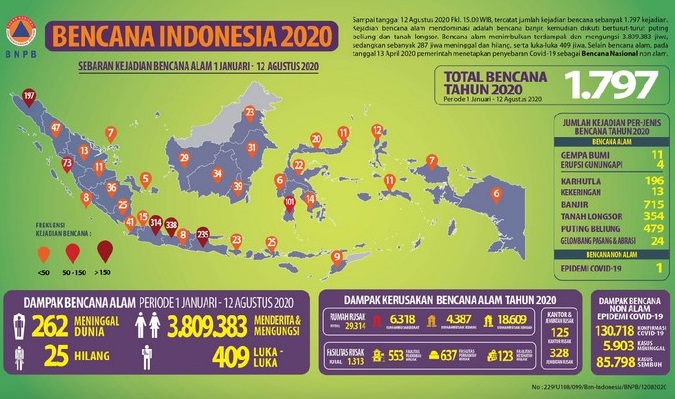SLEMAN - Disaster management policy as stipulated in UU (Law) No. 24/2007 concerning Disaster Management (PB) has been 13 years old. So, it is deemed necessary to make updates according to the results of learning so far, which are adjusted to actual conditions.
Currently the Indonesian Parliament (DPR RI) has proposed the PB Law as the Initiative Right of DPR RI for the period 2019-2024. The process for submitting the PB Bill (RUU) is ongoing, from the DPR to the Government. In the Draft Bill, the National Disaster Management Agency (BNPB) and the Regional Disaster Management Agency (BPBD) are the executors of the main mandate in disaster management (PB). This can be seen from the articles which indicate the mandate that must be carried out. To ensure it goes well, the institutional strengthening needs to be done.
With the UU PB 24/2007, as well as an enforceable mandate, disaster management (PB) and disaster risk management (PRB) have become public awareness. PB/PRB has also been implemented in various sectors, and has been institutionalized. The existing PB systems have been recognized for their excellence, and have even become examples of good practice globally. This was proven by the “Global Champion for Disaster Risk Reduction” award 2011 for the President of the Republic of Indonesia, Dr. H Susilo Bambang Yudhoyono, which was announced in Geneva by the Secretary General of the United Nations Ban Ki Moon.
BNPB Institution
The news that the Government removed the name BNPB as the organizer of PB in the PB Bill has shocked many people as it was no exception for the Chairman of Commission 8 DPR RI, Yandri Sutanto, because this goes against the trend of popular opinion. Therefore, Friday, September 25, 2020, the Work Committee (Panja) of Commission VIII of the DPR RI regarding the PB Bill conducted a Work Visit (Kunker) to Yogyakarta and Padang. It is hoped that the visit the parties in Yogyakarta and Padang can provide input and share good practices.
BNPB has basically carried out its mandate quite well. Indeed, there is still some "homework" that still needs attention. For example, the implementation of PB/PRB still shows the ego-sector “trail”; PRB/PB is not yet fully a movement and lifestyle for the parties. Also, the effectiveness of emergency handling needs to be adjusted to the level of need.
For those reasons, FPTPRB has several recommendations. First, strengthen the PB/PRB governance through adequate allocation of resources for PRB/PRB investment. Second, make the Sendai Frame Work for Disaster Risk Reduction (SF-DRR) as the foundation for the PB/PRB governance. Third, strengthen the existing BNPB/BPBD institutions, to carry out the mandate of coordination, implementation and emergency command. This needs to be done with regard to consideration of good practice and the investment in resources that have been made, as well as future plans. Fourth, ensure the professionalism of human resources in PB/PRB, whether from ASN/PNS, TNI/Polri, academics, volunteers PB/PRB as well as the guidance and determination of competency standards.
Supporting Regulations
Another thing that needs to be considered is that UU PB needs supporting regulations, not the other way around. Some of the needs that need to be included in the additional regulation include: first, expand the space for the role of civil society, media academics, as well as international business organizations in PB/PRB. Second, accommodate the philanthropic citizens’ abilities in disaster financial institutions that are independent, accountable, and non-partisan. Third, give the collective role of universities and scientific associations as a substitute for the function of the steering element, as well as to harmonize the process and results of PT research with the implementation of PB/PRB. Fourth, strengthen PRB efforts, especially at the pre-disaster stage, including: identification, assessment, management and communication of risks. Fifth, strengthen the Disaster Management Plan (RPB) is an integral part of the Village Development Plan.
It is hoped that UU PB will be more based on the disaster risk management, for effective and inclusive disaster management, towards sustainable resilience. It is hoped that BNPB/BPBD together with stakeholders, pentahelix, will carry out the UU PBmandate properly. It needs to make adaptations, the implementation supports a movement; the coordination process will be more participatory and facilitative; and the command process is as an agreement, all are for toughness.
Eko Teguh Paripurno, the Coordinator of Disaster Management Study Program of Universitas Pembangunan Nasional “Veteran” Yogyakarta (UPNVY), the Chairman of the Higher Education Forum for Disaster Risk Reduction (FPTPRB).
Jl. SWK 104 (Lingkar Utara), Condongcatur, Yogyakarta 55283 (Kampus Pusat)
Jl. Babarsari 2 Yogyakarta 55281(Kampus Unit II) | Telp. +62 274 486733



